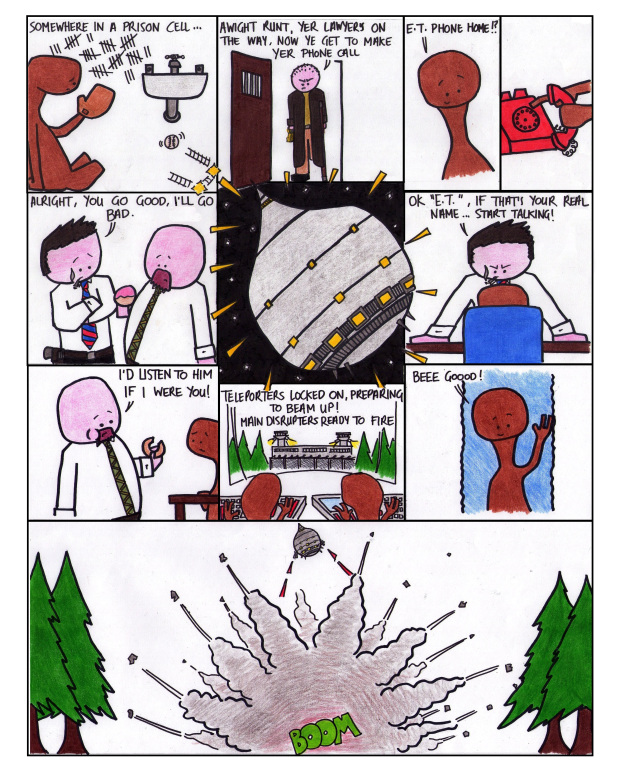I’m a boomer and I’m married to one. Our birth years fall before and after the peak year 1957, when 4.3 million baby boomers were born. Growing older is not an option it’s a fact and I’m not alone.
Consider this statistic: “as of 2016, the number of baby boomers ranged from 74.1 million to 81.3 million, depending on whether the generation begins with the birth year 1943 or 1946. By 2056, the population 65 years and over is projected to become larger than the population under 18 years.” (Information cited from The Baby Boom Cohort in the United States.) The question is how golden will baby boomers ‘golden years’ be.
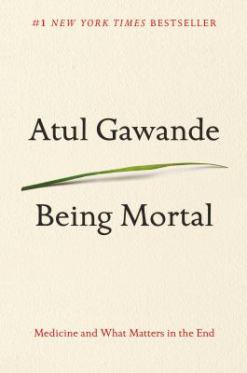 My folks are both still alive in their 80’s and for the most part independent. They provide me a glimpse into what my later years might well look like. When I began reading Being Mortal: Medicine and What Matters in the End by Atul Gawande it was like I’d been given a key to unlocking some of the mystery to changes I’d seen in my folks granting me a greater understanding of those changes.
My folks are both still alive in their 80’s and for the most part independent. They provide me a glimpse into what my later years might well look like. When I began reading Being Mortal: Medicine and What Matters in the End by Atul Gawande it was like I’d been given a key to unlocking some of the mystery to changes I’d seen in my folks granting me a greater understanding of those changes.
Over the past several years my mother has had two orthopedic surgeries and has elected to not have another because of the long grueling process of getting back to a measure of normality. Consequently the severe arthritis she suffers from will eventually limit her mobility, which we’ve briefly discussed.
My Dad has been on blood thinners most of his adult life prompted by a surgery gone awry in his 30’s. While he celebrated his 70th skiing Sun Valley, he has slowed down considerably. A bypass surgery and circulation issues have taken a toll despite his disciplined diet and exercise. On my husband’s side we have had the unique experience of participating in hospice care for both his dad and mom; the one in their own home the other in ours.
You need look no farther than the evening news to hear about the latest medication to ‘ask your doctor about’ with a promise of eliminating the discomforts of getting older. The good news is that there is more hope than advertisements suggest for staying youthful and finding anti-aging supplements.
There are many books on staying young, but I recently came across several books on the subject of aging which is what attracted me to Gawande’s book and taking a candid look at this topic. I recently listened to a local webinar about servicing the aging population in our libraries giving me food for thought and leading me to investigate what our library has available on the subject.
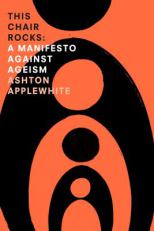
Popular blogger Ashton Applewhite writes This Chair that Rocks. The library has her latest book by the same title This Chair Rocks: A Manifesto Against Ageism. Applewhite is passionate about the subject, and is widely recognized as somewhat of an expert by the American Society on Aging. She asserts that stigmas associated with aging are largely overlooked when it comes to marketing, despite the fact that the ‘silver market’ is the fastest growing. Advertisers cater to 15 to 35 year olds. For a well-researched look at this topic, this is the book that looks to be very relevant.
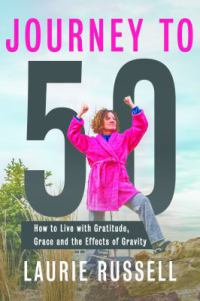 I remember when I turned 50 years old and felt enthusiastic to make some sort of contribution to society, as if raising a family and working the greater portion of my life wasn’t enough. I surveyed my first 50 years and rationalized that the larger portion of my life had passed and if anything meaningful and creative were to occur I’d best get started. Laurie Russell’s Journey to 50: How to Live with Gratitude, Grace, and the Effects of Gravity captures the same spirit I once aspired to. She offers women a practical approach to navigating the 50th decade, sprinkled with humor and spiritual insights. Here is a quote: Giving up is easy. Letting go takes effort and can be painful- but it frees you to become anew.
I remember when I turned 50 years old and felt enthusiastic to make some sort of contribution to society, as if raising a family and working the greater portion of my life wasn’t enough. I surveyed my first 50 years and rationalized that the larger portion of my life had passed and if anything meaningful and creative were to occur I’d best get started. Laurie Russell’s Journey to 50: How to Live with Gratitude, Grace, and the Effects of Gravity captures the same spirit I once aspired to. She offers women a practical approach to navigating the 50th decade, sprinkled with humor and spiritual insights. Here is a quote: Giving up is easy. Letting go takes effort and can be painful- but it frees you to become anew.
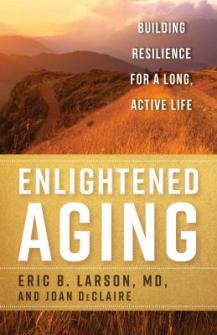 Eric B. Larson, MD is an expert on the science and subject of healthy aging. He has spent much of the past 40 years studying the aging process. From our own backyard in the Pacific Northwest, Dr. Larson is a clinical professor of medicine at the University Of Washington School Of Medicine and of health services at the UW School of Public Health. He has worked and cared for thousands of elderly people. In his book Enlightened Aging: Building Resilience for a Long Active Life, co-authored with journalist Joan DeClaire, Dr. Larson shares case studies giving the reader a scientific and medical perspective. Right up front he states “There is no magic bullet’,” He believes resilience in those who age well is born out of their capacity to adapt and grow stronger in the face of adversity and stress. The book discusses key concepts that contribute to individuals in the aging process. They are proactivity, acceptance, and the three reservoirs: mental, physical, and social.
Eric B. Larson, MD is an expert on the science and subject of healthy aging. He has spent much of the past 40 years studying the aging process. From our own backyard in the Pacific Northwest, Dr. Larson is a clinical professor of medicine at the University Of Washington School Of Medicine and of health services at the UW School of Public Health. He has worked and cared for thousands of elderly people. In his book Enlightened Aging: Building Resilience for a Long Active Life, co-authored with journalist Joan DeClaire, Dr. Larson shares case studies giving the reader a scientific and medical perspective. Right up front he states “There is no magic bullet’,” He believes resilience in those who age well is born out of their capacity to adapt and grow stronger in the face of adversity and stress. The book discusses key concepts that contribute to individuals in the aging process. They are proactivity, acceptance, and the three reservoirs: mental, physical, and social.
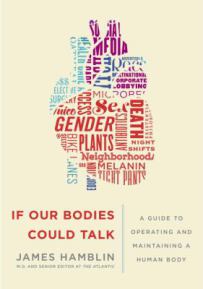
If Our Bodies Could Talk a Guide to Operating and Maintaining a Human Body by James Hamblin M.D. is not solely about aging. It contains a plethora of subjects addressing an exhaustive list of questions; questions you may want to ask your doctor but think are too silly to ask. Take for example these two: How much sleep do I actually need? and Can I train myself to sleep less? This book is broken up into six categories associated with the body and how various parts operate. There are hand drawn diagrams that combine entertainment with educational answers, breaking up what might otherwise have been too technical. Whether you read one or two sections, you will find plenty of practical advice including the main topic of this blog: ‘Enduring: the dying parts.’ I really enjoyed the book jacket depicting a colorful word cloud.
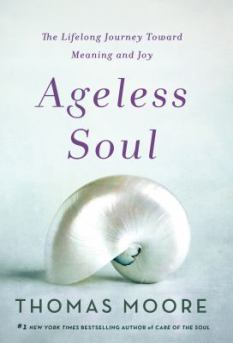 If you’d prefer to read a less technical book with a more personal connection, there is Malachy McCourt’s memoir Death Need Not Be Fatal. Or you may find solace in reading Thomas Moore’s latest book offering a more philosophical approach, Ageless Soul: The Lifelong Journey Toward Meaning and Joy.
If you’d prefer to read a less technical book with a more personal connection, there is Malachy McCourt’s memoir Death Need Not Be Fatal. Or you may find solace in reading Thomas Moore’s latest book offering a more philosophical approach, Ageless Soul: The Lifelong Journey Toward Meaning and Joy.
Life is a series of seasons from youth to old age, how we weather those seasons is largely up to us. As I look forward to my golden years I’m grateful for my health and the many resources available at the library to help me through them. I realize golden may look bronze or silver, but that’s OK!
Share this:




